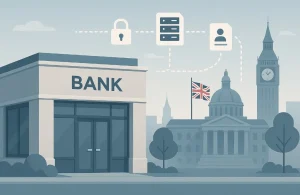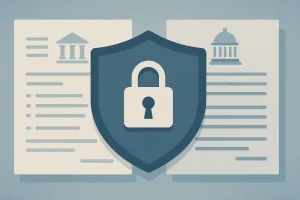Table of Contents
ToggleWhat if your bank shared information about your savings with the Department for Work and Pensions (DWP)? What if this data could affect your entitlement to State benefits like Pension Credit?
Starting from 1st September 2025, new banking regulations will give the DWP expanded powers to collect certain types of account information to verify eligibility for means-tested benefits.
This change is part of the Public Authorities (Fraud, Error and Recovery) Bill, which aims to reduce fraud and administrative errors across the UK’s welfare system.
While the rules are not designed to monitor how people spend their money, they do allow banks to flag accounts that may not comply with benefit criteria especially those where savings exceed allowed thresholds.
The rules will particularly impact pensioners receiving or applying for Pension Credit, a benefit targeted at those with limited income in retirement.
However, questions remain about how this policy will be applied, what data will be shared, and what it means for those already struggling with the complexities of the UK benefits system.
Why Has the DWP Introduced These Changes?
The driving force behind the new regulations is a growing concern over fraudulent claims and accidental overpayments.
In recent years, billions of pounds have been lost due to people receiving benefits for which they were not financially eligible either due to undeclared savings, inaccurate information, or systemic failures.
The DWP currently relies heavily on self-declaration and periodic reviews to assess whether claimants meet eligibility conditions. This has proven to be a weak link in cases where individuals forget, neglect, or intentionally fail to report changes in their financial circumstances.
By allowing the DWP to request basic account data from banks, the government aims to create a more efficient and accurate verification system.
The focus is not just on identifying large-scale fraud, but also on correcting minor errors that lead to unnecessary overpayments, though critics argue that this may place undue pressure on vulnerable groups like pensioners.
What Type of Information Will Banks Share with the DWP?

Contrary to public concern, the new rules do not grant full access to individuals’ bank accounts. Instead, the data sharing is limited in scope and strictly regulated under data protection laws.
Banks will only be required to provide:
- The account holder’s name
- Date of birth
- Information related to whether the account meets certain eligibility indicators, such as savings thresholds
Crucially, the DWP cannot see transaction histories. This means they will not have access to how money is spent, what is being bought, or any regular activity within an account. The information is purely designed to determine if savings might disqualify a person from receiving certain benefits.
In practical terms, if a pensioner holds more than £16,000 in savings, a bank may flag that account for review if the individual is receiving Universal Credit or Pension Credit, both of which have savings limits.
No benefit decisions will be made based solely on this data. Instead, it may trigger further inquiries requiring the claimant to provide supporting documentation.
Who Will Be Affected by These Banking Rules?
These changes are targeted at individuals receiving means-tested benefits, especially where savings thresholds play a role in determining eligibility. Pensioners claiming Pension Credit will be among those most directly impacted.
The rules will also affect:
- New applicants to Universal Credit, Housing Benefit, or Income Support
- Individuals whose savings have increased recently due to inheritance, property sales, or matured investments
- Joint account holders, where combined savings may exceed the eligibility limit
It’s important to note that those receiving only the State Pension, without claiming any additional means-tested support, will generally not be affected unless they apply for further assistance in the future. However, for anyone considering applying for Pension Credit, these rules must be understood in full.
What Should Pensioners Do to Stay Compliant?

The DWP is not asking pensioners to take drastic actions, but awareness and timely updates are essential. Understanding the eligibility limits is the first step.
For Pension Credit, the threshold for capital assets and savings typically begins to impact eligibility from £10,000, with a total cut-off around £16,000 depending on individual circumstances.
Secondly, all account details must be accurate and up to date. Inaccuracies in name spellings, addresses, or dates of birth could lead to unnecessary flags in the system. Pensioners should ensure that their information matches across DWP records and bank records.
If there are changes in savings, income, or living arrangements, these should be reported promptly to the DWP. For example, if a pensioner sells a car or receives a one-time gift that temporarily increases their savings, reporting this ensures that no automatic flags lead to delays or suspensions in payments.
Will These Rules Delay Pension Payments?
Payment delays are possible but only under specific circumstances. If a flagged account appears to breach eligibility conditions, the DWP may pause benefits while seeking further clarification. However, a simple flag does not mean benefits will be stopped.
In most cases, the DWP will contact the claimant to request additional information or clarification. Only after a proper review will decisions be made regarding benefit continuation or suspension.
For instance, consider the case of Thomas, a pensioner from Manchester who received a £5,000 inheritance from a late relative. This amount temporarily pushed his total savings above the eligibility threshold for Pension Credit. Upon review and explanation, it was accepted as a one-off and his benefits continued uninterrupted.
How Does This Affect Privacy and Data Protection?

A primary concern for many is the issue of data privacy. The new rules have been built with several safeguards to protect individuals from excessive data scrutiny.
The DWP does not have direct access to bank accounts. Instead, banks run internal checks to identify whether accounts meet certain risk indicators. Only then is limited, high-level information shared with the DWP.
To further protect claimants, banks are legally bound not to share more than what is required. If they overstep these boundaries, they could face penalties under data protection laws.
There are also ongoing discussions about the proportional use of these powers, ensuring they are not used punitively or against minor errors.
Are Digital and Online-Only Bank Accounts Also Subject to Checks?
Yes. The rise of digital banks such as Monzo, Starling, and Revolut means many pensioners now manage their money through non-traditional institutions. These banks are also subject to the new rules, provided they are:
- FCA-regulated
- UK-based
- Participating in the government’s data-sharing framework
As long as the bank falls within these criteria, it must comply with the DWP’s data request processes. For pensioners using joint accounts or accounts managed by someone else under a Power of Attorney, clarity and consistency in account ownership are essential to avoid confusion during automated checks.
Will Everyone Receiving Benefits Be Monitored?

The DWP has clarified that the system will not be used to monitor every benefit claimant indiscriminately. Instead, checks will be risk-based and targeted, focusing on accounts that show clear signs of potential discrepancy.
Those whose accounts are well within the thresholds or whose records remain consistent are unlikely to face frequent reviews. The goal is to optimise resources by focusing on cases that represent the highest risk of fraud or overpayment, rather than spending time on minor or accidental errors.
How Do the New Rules Compare to the Previous Process?
To illustrate the changes, here is a brief comparison:
| Criteria | Before 1 Sept 2025 | After 1 Sept 2025 |
| Savings Verification | Self-declared or manually reviewed | Automated bank checks via data sharing |
| DWP Access to Accounts | No access | No access (still restricted) |
| Type of Data Shared | None | Limited (name, DOB, savings flag) |
| Privacy Controls | General GDPR rules | Enhanced with penalties for oversharing |
| Impact on Payment Delays | Minimal | Possible if flagged and unresponsive |
What Are the Wider Concerns Around These Rules?

Despite reassurances, critics argue that the new rules could lead to over-policing of minor errors and create fear or confusion among pensioners. Charities and social care advocates have voiced concerns that individuals may be unfairly penalised for legitimate, temporary changes in savings.
There is also concern over digital exclusion, as some older individuals may not have the tools or knowledge to monitor their records or respond to electronic communications. The DWP must ensure clear communication and support services are available, particularly for vulnerable or isolated individuals.
Nevertheless, proponents argue that these reforms are necessary to modernise the system, safeguard public funds, and reduce reliance on outdated manual processes that are prone to error.
Frequently Asked Questions
What information will the DWP receive from banks?
Only limited information: your name, date of birth, and a flag indicating whether your account appears to meet or exceed savings thresholds.
Will the DWP know how I spend my money?
No. The DWP will not see your transaction history or account activity.
Are private pensions affected by this rule?
No. These rules apply only to means-tested benefits, such as Pension Credit, not to private or occupational pensions.
Will I be notified if my account is under review?
You may be contacted if a data match triggers further inquiries, but not during routine checks.
Can I dispute a flag or decision?
Yes. If your account is flagged, you will be given the chance to provide evidence or explanations before any action is taken.
What if I don’t use online banking?
You can still respond to DWP inquiries by post or phone. Paper communications will remain in use for those not online.
Where can I get help with this process?
You can contact the DWP, visit a local Jobcentre Plus, or seek advice from Citizens Advice or Age UK.




